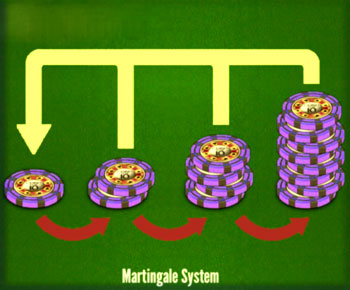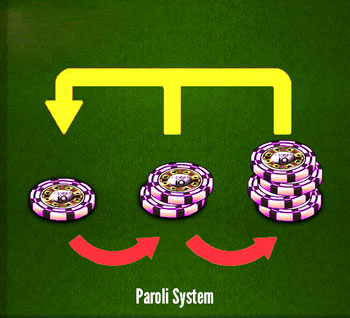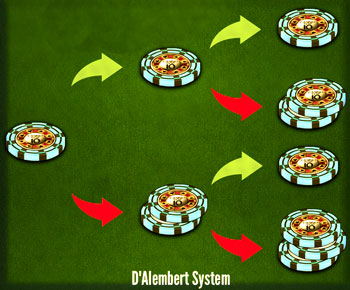



Both speculation and gambling, by their very nature, are different forms of risk-taking behavior. These two activities are based on the same principle of risk-to-reward ratio; however, there is a big difference between them. Namely, speculation is a risk management activity, whereas gambling is most often associated with randomness.
There is absolutely no way to predict a randomly generated outcome. Whether and when a slot machine will pay out isn’t affected by any outside factors, except for the RNG (random number generator) system. All gambling (and casino games) comes down to chance.
Regardless of whether you are playing at a casino for the first time, or you’ve already bet on a million spins, the odds of winning are still the same. Likewise, just because the ball has landed on red three times in a row doesn’t mean it is going to land on black (or red) the fourth time.
This is where the gambler’s fallacy comes from. This is an unfounded, untrue belief that a certain outcome has to occur as more time passes. In fact, the ball can land on red an infinite number of times in a row. This is unlikely, but possible. The correct term would be “statistically improbable.”
The point we’re trying to make is that previous results don’t mean anything, because they do not affect the outcome of the next roulette spin in the slightest. You may know where the ball landed a thousand times prior to making a bet – the chances of it landing on a particular number will still be the same.
Since literally nothing can impact a randomly generated outcome of a casino game, it’s easy to conclude that these games of chance are based solely on luck. In other words, there’s no such thing as a good, or skilled, slots/roulette player.
If Lady Luck smiles upon you – you’ll win; otherwise, you’ll lose. At best, you can employ specific gambling systems and/or bet on better odds. However, if you cover two-thirds of the roulette table, the payout will be much lower when you win. And, of course, you could lose a hundred spins in a row, even with 66% odds in your favor.
That’s not to say you can’t win at casino games. You certainly can. For years, countless people have hit the jackpot and become millionaires overnight. It happened not because they practiced, analyzed and honed their “gambling skills.” There’s no way one deserves to win at a casino. Each and every single winner simply got lucky.
On the contrary, speculation is the polar opposite. No performance of the stock market is ever random. Every single event and outcome, every change in the market is a consequence of a specific action. In other words, there is a way to predict the likelihood of a specific outcome.
Of course, for the prediction to be accurate, you must consider a bunch of different variables. Naturally, it’s virtually impossible to know how other actors in the market will behave and predict every event that might affect the price of a certain commodity.
However, all traders rely on empirical data to form their predictions. Before they engage in speculation, they gather and analyze the data, look at charts and forecasts, monitor current events, etc.
There are a considerable amount of skills required to make the right move in the stock market. It should be no surprise that there are schools, universities, courses and internships for traders.
An experienced trader notices the nuances and subtle movements in the market and recognizes good opportunities for investment. At the same time, an intern will need to hone his/her skills for years before reaching such a level.
This is exactly what separates speculation from gambling – the level of skills. It doesn’t take much skill to bet $100 on black, right? But if you start day trading and just randomly buy and sell stuff on the market, you’ll likely end up broke within a few days.
In the end, it all comes down to the odds. They are fixed and players always know them. However, markets are fluid and can be highly volatile. So, you need to be aware enough to know when to make your move.

Let’s say you’re betting on soccer. You would look at the current standings of the two teams, their history, the teams’ line-ups, injured players, who needs the points more, etc. Although there is still some level of uncertainty that’s unavoidable, in most situations you can conclude which team is far more likely to win.
So, in a sense, you would be doing the same thing traders do in their day-to-day routine. You’ll crunch the data, analyze previous performances and current events and bet on the most likely outcome. That’s why it’s called sports betting, rather than sports gambling.
Of course, there are things for which nobody can account, which may end up determining the end result of a soccer game. The favorite might struggle to score or hit the post three times in a single game, while the underdog may feel motivated and “leave their hearts on the field.”
Unless you can predict the future, there’s no way to be 100% sure that a specific outcome will occur. The same applies to real estate investment, commodities, futures and forex trading.
It’s all about taking into consideration every visible variable that might affect the outcome. Some things, like natural disasters, for instance, are next-to-impossible to predict. Still, these “unwelcome surprises” don’t happen very often. Save for a total disaster, or market collapse like in the American Great Depression, a skilled trader will be profitable in the long run.
Now that we’ve made a vital distinction between gambling and speculation, we wish to dedicate a bit more attention to the phenomenon of gambling. The question that still arises is why is gambling so appealing?
The charm of gambling comes precisely from the fact that you cannot predict the outcome of the game. The thrill lies in the possibility of beating the odds. Winning or losing isn’t quite as important as it may seem at first glance.
Sure, you’ll be disappointed if you lose. Likewise, you’ll be brimming with joy each time you win. But most people will continue to gamble, regardless of the outcome. As weird as it may sound, there’s a perfectly logical explanation behind this behavior.
We feel an adrenaline rush as the game takes place. Before we even see where the reels stop, it’s the possibility of that big win that keeps us on our toes. When we lose, we just keep going, replicating that same feeling.
Another interesting process that goes on in our bodies is related to the “happy hormone,” dopamine. When we win, our bodу produces more dopamine, making us feel happy and joyous. What’s fascinating is what happens when we’re on a losing streak. We subconsciously lower our expectations, so when our luck finally does turn around, the influx of dopamine feels even better.
Thus, we catch ourselves in a complex biological trap. Whether you win off of the first or the hundredth spin makes little difference. If you win often, you’ll want to replicate that feeling, but you will have to win even larger sums to feel the same. If you seldom hit the winning combination, the after effect will be more lasting, pretending it was worth the wait.
Both dopamine and adrenaline are largely responsible for the development of gambling addiction. So, it’s no surprise that scientists researching problem gambling are leaning towards blaming an individual’s biology, not the individual himself/herself.
After all, gambling addicts are well aware of how their addiction affects their lives and the lives of those around them. It’s not that they’re incapable of rational thinking. It’s just that they are so entranced by that feeling of dopamine and adrenaline rushing through their bodies, they cannot resist the urge.
With the rise of the online gambling industry, gambling addiction is becoming a more severe problem. Online casinos have made this form of entertainment easily accessible and a lot more convenient. When you can gamble anytime, anywhere, it can be quite difficult for problem gamblers to keep their addiction under control.
Not only does gambling create this form of addiction, but people also look for other sources of adrenaline and dopamine – in a variety of different activities. You’ve probably heard the expression “adrenaline junkie.” Admittedly, this term is often used in relation to extreme sports, but it doesn’t necessarily need to be that exclusive.
That said, there are a few differences between gambling and other forms of entertainment that can be just as addictive. We’ve already talked about the accessibility of gambling, especially in an online environment. It’s readily available, no matter the time of day or night.
Moreover, there’s no hassle involved with gambling in an online casino. The only thing you need is an Internet connection. And your credit card, of course. And therein lies the problem. Typically, gambling is quite expensive. Before you know it, you’ve gambled away more than you can afford.
As you can see, high risks are inherently associated with most forms of gambling. And we’re not just talking about the odds, although it pays to remember the old adage that, “the house always wins.”
Nearly every game has a house edge, as tiny as it may be. In other words, you don’t have a 50/50 chance of winning. To walk away from a casino with more money in your pocket, you legitimately need to get lucky and beat the odds.
Going back to the difference between gambling and speculation, it’s important to understand that traders only take calculated risks. Using layman’s terms, both buyers and sellers on the market actively work to leave as little to luck and fate as possible. To make an analogy, you can say that experienced traders are not relying on luck, but rather on their acquired knowledge and data. When they make a wrong investment, which does happen, it’s either because they failed to consider something or were extremely unlucky.
Throughout the years, gamblers have attempted to implement speculation in games of chance. It’s a natural reaction to losing and a result of our deeply rooted inability to accept the fact that some events are, in fact, purely random.
So, for centuries, people have attempted to devise all kinds of different strategies and betting systems that would allow them to “beat” the games. As you can imagine, none of them are particularly effective since, and we can’t stress this enough, gambling ultimately relies on luck.
Still, here’s a brief view of the three most famous betting systems, in case you wish to satiate your curiosity.

You start by defining your base bet. The sum should be a portion of your bankroll. For example, say your base bet is a dollar. Whenever you lose, you double the previous bet. Regardless of how many times you lose in a row, whenever you win, you will get all of your previous bets back, and you’ll end up with $1 profit, which is the size of your original bet.
After a win, you simply revert to the base bet and start over. It’s easy to see the flaw of this system from a mile away. First, there’s the assumption that you must eventually win. This is partly true, but it implies that you have an infinite amount of money to wager.
Let’s say you’re attempting to use this strategy while playing roulette. Even if you start with $1, after 10 losses in a row, you would’ve said goodbye to over $1,000. It’s highly unlikely the ball will land on black 10 times when you’ve bet on red. But, it’s not impossible.
In one recorded instance, in the Monte Carlo Casino, the ball landed on black an incredible 26 times in a row. Sure enough, it landed on red eventually, but not after wiping the bankrolls of dozens of gamblers.

It’s up to the player to decide how much they should increase the bet and what’s the maximum amount of money they want to wager on a single round/spin. Typically, gamblers tend to increase the wager by one base bet and withdraw money, or revert to the base bet, after 5 wins in a row.

Sounds good on paper, doesn’t it? However, it still requires you to go on a winning streak to end up with some money in your pocket.
Outcome depends on whether Lady Luck is on your side or not. Whether you bet $1 or $100 on a single slot spin makes absolutely no difference. Whichever betting system, strategy or method you employ, you still need to get lucky.
That’s the main difference between gambling and speculation. That said, although speculation is typically more profitable, it may also be a full-time job that could require 4 years of the college education and then a few years of internship on top.
As you can imagine, when you get to the point where you’ve developed the necessary skills to become a successful trader, it turns out to be hard work. And that is arguably the biggest difference.
Gambling should be a casual, fun activity. If you approach gambling expecting you’ll win money every time you sit down at a machine or a table, you need to adopt a new mindset. And the sooner, the better.
In the end, you should only gamble for fun. Treat every win as a cherry on top, while you should aim to make every play session into a fun, exciting, gaming experience. If you want to make money, then learning the art of speculation is much more reliable. On that note, always gamble responsibly and in moderation.

Cryptocurrency is a huge trend nowadays; and no matter what the bankers say, it’s a pretty convenient online payment method! You don’t need a card or a bank account to use them. You don’t pay commission, and your transactions are unlimited and instant. Hell, you don’t need anything except a stable Internet connection. You can […]
The guy with Elmo’s head, Pink Bunny, Julius Caesar, or even a mysterious visitor wearing a Wonder Woman costume. And thousands of individuals disguised under hoodies and dark sunglasses. Are you sure we’ve come to the right place? Because we were heading to the poker tournament… Yes, there’s no mistake here! But why is the […]
The game of roulette offers a broad variety of betting options. With all the possible betting methods and strategies that gamers may use in an attempt to get lucky, wagering money on roulette can become a challenging, and even a thrilling, task. The intrigue is that whatever betting decision you make before the next spin, […]
This question is probably as old as casino gambling itself. But risk-takers are still playing every game they can their hands on, both in online and land-based casinos. This fact is one piece of good evidence to say that the “best odds of winning” problem still doesn’t have a good answer. Of course, there are […]
If you love gambling and have been to a land-based casino at least once, you may have thought about becoming a dealer. Playing the same game but from the opposite side, while communicating with other players, sounds like a dream job, right? A dealer is a straightforward job, and you will be the heart and […]
On Monday September 14, MGM announced that it plans to open its first smoke-free casino at the end of September, when Park MGM will finally reopen its venues to players and tourists. The resort comprises around 2,990 rooms and various restaurants, and it’s set to be reopened on September 30. The venue has been closed […]
Online gambling has undoubtedly taken a place of true supremacy over the casino industry during the pandemic. And the reason for that is quite clear: online casinos are more accessible, and you can always count on some encouragement from the casino administration to help you boost your game. However, this digital revolution has only been […]
The large selection of online gambling sites out there can make players somewhat puzzled, and give them a feeling of uncertainty about making the right choice of casino. Each online gambling venue offers its own conditions, games, and various bonuses, of course; but the most important thing is the reliability of the casino and the […]